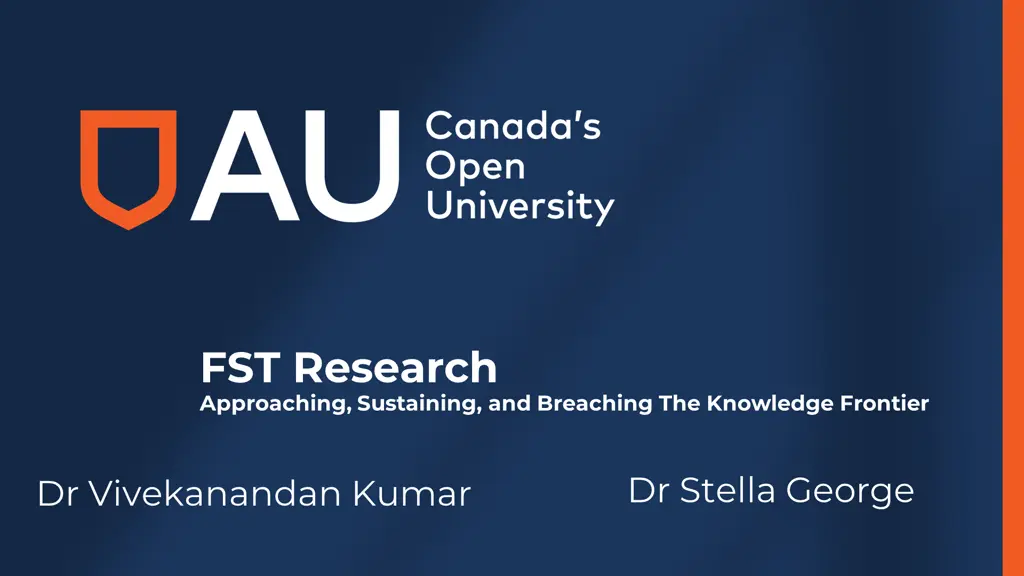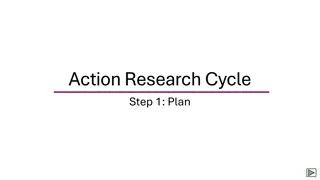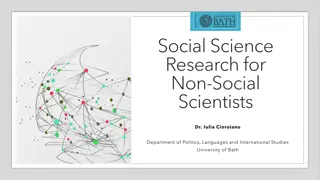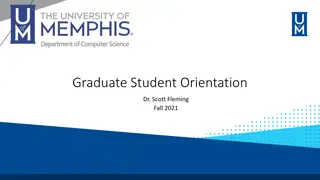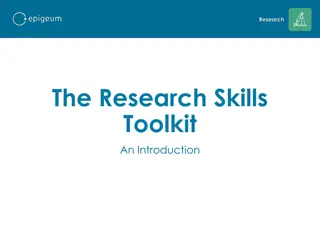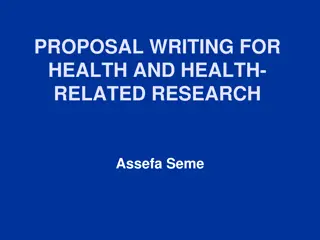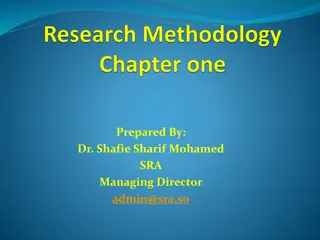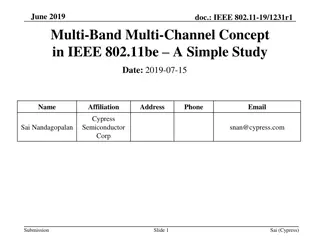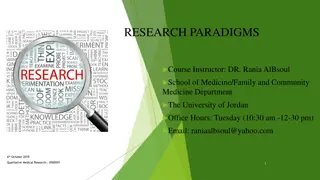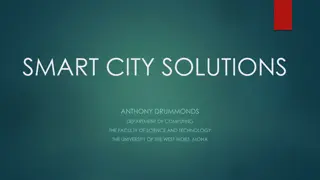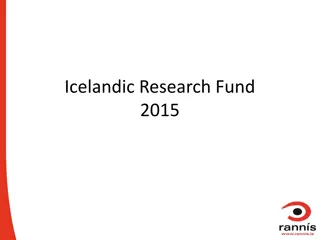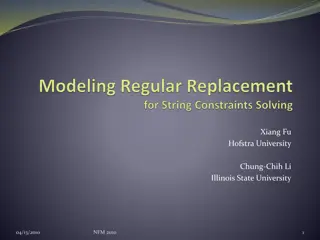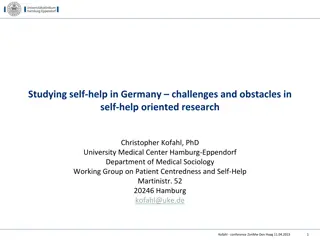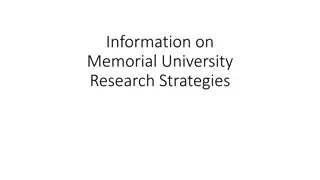FST Research
Approach, sustain, and breach the knowledge frontier through the Researcher Development Framework. Explore different research clusters and embrace passion, creativity, and picking a research area. Stay informed with continuous literature flow and meta-analyses.
Download Presentation

Please find below an Image/Link to download the presentation.
The content on the website is provided AS IS for your information and personal use only. It may not be sold, licensed, or shared on other websites without obtaining consent from the author. Download presentation by click this link. If you encounter any issues during the download, it is possible that the publisher has removed the file from their server.
E N D
Presentation Transcript
FST Research Approaching, Sustaining, and Breaching The Knowledge Frontier Dr Stella George Dr Vivekanandan Kumar
Approaching Knowledge Frontier Indigenous knowledge as a term that refers to a set of complex knowledge systems based on the worldviews of Indigenous peoples. Indigenous knowledge reflects the unique cultures, languages, governance systems and histories of Indigenous peoples from a particular location. Indigenous knowledge is dynamic and evolves over time. It builds on the experiences of earlier generations and adapts to present conditions. First Nations, Inuit and M tis each have a distinct way of describing their knowledge. Knowledge-holders are the only people who can truly define Indigenous knowledge for their communities - (Govt. of Canada) to extend human knowledge beyond what is already known. An individual s knowledge enters the domain of science only after it is presented to others in such a fashion that they can independently judge its validity - (National Academies of Science, Engineering and Medicine, NA Press, On Being a Scientist 1995)
Passion, Creativity, and Picking a research area/topic RESEARCH CLUSTERS/Groups User Adaptive Systems Intelligent Systems and Machine Learning AI Agent Virtual Lab Cyber-Physical Systems Regenerative Design and Sustainability Northern Ecosystems ARBRI
At the Knowledge Frontier As part of a research cluster/group/institute, maintain a continuous flow of incoming literature and waves of analyses. Clusters, by nature, tend to attract other similar structures forming a network. Meta analyses should be a regular activity in a cluster. To be data-informed and proactive, research activities should become traceable in terms of portfolios, datasets, models, and arguments. Trace your article writing, coding, design, reading, synthesizing, Research productivity or acknowledgement by a knowledge holder can be measures of one s proximity to the knowledge frontier.
Researcher Development Framework to Breach the Knowledge Frontier
Researcher Development Framework to Breach the Knowledge Frontier
Researcher Development Framework to Breach the Knowledge Frontier
Researcher Development Framework to Breach the Knowledge Frontier
Researcher Development Framework to Breach the Knowledge Frontier
Researcher Development Framework to Breach the Knowledge Frontier
Breached Frontier Becoming independent and self-sustaining researchers, in clusters and networks Maintaining a healthy research-life balance Seeking career potentials through experiential learning, RAships, internships Publishing in formal (top journals) and informal (TheConversation.com, DORA) Trace the evolution of research competencies; Mahara has a built-in SmartEvidence for RDF; traces could be about reading, writing, designing, synthesizing, discussing, collaborating, watching, coding, presenting, or any other research related activity
Tools of the Knowledge Frontier Researcher development framework (https://www.vitae.ac.uk) Auto Structured Lit Review (https://rpubs.com/WesSauder/760002), References management (JabRef, ), Open data repositories (osf.io/fxvru/; registry.opendata.aws/), E-Portfolio (Mahara SmartEvidence, ) Research Data Management (canarie.ca/rdm) Research Analysis (SPSS, R, NVivo, AWS, MS, ) Agile Learning (Jira, Miro, Trello, )
Ethical behavior is doing the right thing when no one else is watching - even when doing the wrong thing is legal. (Aldo Leopold)
Your ethical behaviour Athabasca University s rules: Academic Integrity Research Ethics 1. Your actions in relation to the rules (i.e., laws and regulations) 2. Your action in relation to what you believe is right in your community and society, i.e. morals Outcome is most important (teleological) Intent is most important (deontological) Importance depends on the other factors in a situation (relativistic) Inner guidance is most important (virtues)
Academic Integrity Applies to everything you do as a student at AU. Regulations are clear, disciplinary process is thorough, and penalties are applied. Read more at Student Code of Conduct and Rights to Appeals (http://calendar.athabascau.ca/undergrad/current/student- code/academic-misconduct-offences.php) Academic offences include: 1. admissions offences 2. plagiarism 3. cheating 4. collusion 5. unauthorized use of Athabasca University materials 6. misrepresentation of facts and fraud 7. aiding another in committing an academic offence
Academic Integrity- Self Check Relativistic beliefs are most likely to get you in trouble -> Importance depends on the other factors in a situation extenuating circumstances (ill health, external circumstances etc ) are best dealt with ahead of the problem and appeals exist to help understand complexity of the issue! Beliefs that help avoid academic offence : I want my degree and/or to have learnt about this topic; getting caught means I risk gaining my degree Outcome is most important (teleogical) I want to succeed in learning and passing the course, by cheating I compromise my learning Intent is most important (deontological) I don t want to waste time, I don t want to spend more money BUT I know cheating is wrong and I won t do it Inner guidance is most important (virtues)
Research Ethics Ethics applied your research process Fabrication, Falsification, or Plagiarism Start your research (subject) ethics checks BEFORE your research (this is a rule). Research Ethics Portal at http://research.athabascau.ca/portal/index.php Lots of useful information about: 1. what needs ethics approval (and thus what does not) Involves humans (alive, dead or parts of); public figures (private data); animals; secondary data (i.e, collected for another reason and not anonymized); quality assurance or evaluation research questions. <<Interviews and surveys involving people need approval.>> 2. application process Well structured online form Concerned with respect for the person, impact of research, fairness of research Full review for human subjects, document review for other.
What doesnt need REB review and approval? Research about individuals in the public arena using only publicly available or accessible records without contact with the individual/s. Research involving naturalistic observation in public venues. Quality assurance studies, program evaluations, performance reviews, and testing within normal educational and/or organizational requirements, to be used for assessment and/or improvement purposes; and there is no research question involved. Research based on review of published/publicly reported literature. Research involving secondary use of data (Article 5.5) which is provided without any identifier or group of identifiers which would allow attribution of private information to an individual. Consulting, unless carried out under the auspices of the university. Government Research Panel on Ethics provides training for all researchers (faculty and students) - - https://ethics.gc.ca/eng/education_tutorial-didacticiel.html Course on Research Ethics (CORE)
